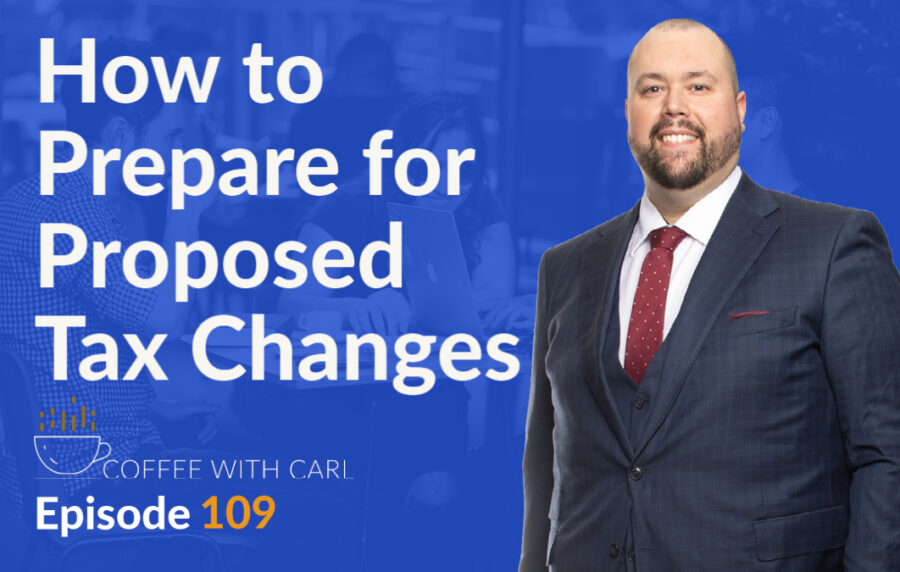Is there a way to take action BEFORE tax changes are passed?
In this episode of Coffee with Carl, attorney Carl Zoellner guides you through the process of preparing for impending tax changes.
It’s been all over the news, and now it’s on everyone’s mind.
How should we deal with proposed tax changes?
There are lots of rumors and lots of proposed tax changes that are out there right now coming from the Biden administration.
Most notably at the beginning of the year was Prop 19 issues in California. And we were always asked, well, how do we plan ahead for some of these tax issues I keep seeing in the news?
To be completely honest with you, your best bet and the way we approach it is the tax planning happens after the law is passed. It’s not so much that we don’t think the information is valuable, but we also need to understand the legislative process and the way these proposals start, the process is not the way they end it.
A lot of these initial proposals inevitably go through a revision process.
With additional pieces added on, riders, etc. So really when it comes to planning from the tax perspective, it’s better to wait until the final law is in place, then do your planning. We’ve seen a lot of clients who try to pre-plan or jump the system on getting ahead of tax changes. It really worked against them in the long run because by the time that tax law went from proposal to bill to law, it was vastly different and they ended up hurting themselves because they made the change too early.
While we certainly believe in being proactive, when it comes to legal changes or law changes, especially in regards to the tax code, the best course of action is to hold tight. See what the change is first, then you can make some revisions to make sure that you’re doing the correct amount of planning for your taxes.
Now, I’m just going to go over a single scenario because this happens all too often. All of a sudden some tax change is going to happen and then people want to just give properties to their family, or to their kids.
Before considering that, a couple of things to note about going that route. Number one is: if I’m gifting a property to my hypothetical kid here, my kid gets that gift at the basis I purchased that property. What I see a lot is in California, some parents have owned this property for 10, 20, 30 years. It has increased in value almost exponentially over that time, but now the kid owns the property at basically the value the parents purchased it for, back in the day.
Now, a separate scenario: the parent passes away and gifts the child the property through their estate or through their living trust. The child received the property at current market value. They don’t receive it on the parents’ basis.
So if we look at the numbers really quickly, let’s say the parents bought a property in California for $50,000. I give that property to the kid while I’m alive still at a current market value of $200,000. The child receives the property at $50,000 from their tax basis in that property. They go to sell the property. Let’s say they sold it for that $200,000. They have $150,000 of gain if they sell it the day it was gifted to them.
Now, let’s wait, let’s look at another scenario. Let’s say mom and dad set up a living trust, have the property in the trust and pass it on to the kid after they’ve passed away. Let’s use the same numbers just to keep it simple. They bought the property at $50,000. At the time of their passing, the property is worth $200,000. Now the child inherits the property at $200,000. If they sell it that day and the value is still the same, zero taxable gain.
These are some of the things we need to look at when we start talking about tax planning and to my original point with all these proposed changes. There are lots of things that get proposed on an annual basis, especially within a president’s first term and all of these other options. I would caution and advise clients. Once there is a law or a law in place, then we can look at what kind of changes need to happen to make sure you’re in the best position.
There are tons of tools out there as far as tax and asset protection. And quite frankly, if there is some sort of sweeping change, if you look at the long term history of legislative changes, it’s rarely some huge impactful change that happens.
It’s usually incremental.
And then by the time it gets to be good, standing on the doorstep of hitting a sweeping change, It flips back to the other Congress and the presidency has usually flipped back to the other team. You should wait until it’s a law before you start planning if you want to be effective and efficient in your protection.
The Takeaway
As always, keep taking advantage of our FREE educational opportunities and the FREE content we put out on the web.
Our Structure Implementation Series is fantastic. That answers a lot of the questions you have in the beginning. So there are a lot of different educational opportunities out there. One of my favorites as well is our Infinity Investing Workshop.
Resources mentioned in this video:
- Join our next Tax & Asset Protection event to learn more advanced tax minimization & entity structuring strategies
- Subscribe to our YouTube channel to make sure you never miss the latest strategies & updates
Got an idea for a future Coffee with Carl? Send it to Carl at cwc@andersonadvisors.com.











